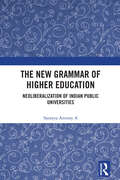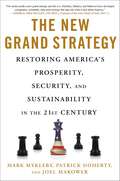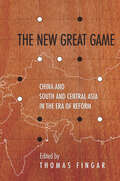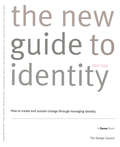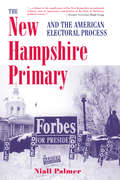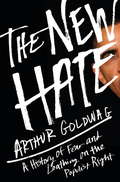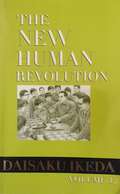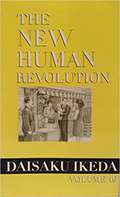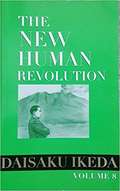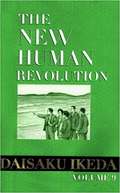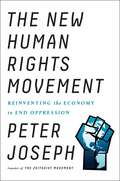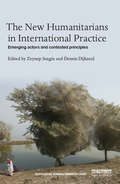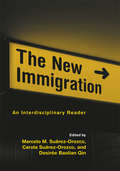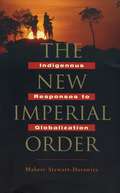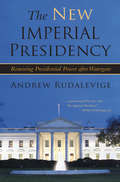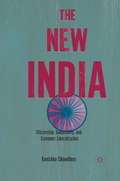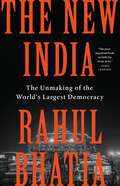- Table View
- List View
The New Grammar of Higher Education: Neoliberalization of Indian Public Universities
by Saranya Antony AThis book delves into the intricate layers of neoliberalization and its challenges, which obstruct accessible and equitable education in Indian public universities. Through a scholarly lens, this work meticulously examines the persistent hurdles that have marred higher education in India, spanning ancient times to the present neoliberal era. It probes into the neoliberalization of public universities within the broader spectrum of the Indian higher education landscape, encompassing fund cuts, fee hikes, seat reductions, and the emergence of private universities.Central to the narrative is the assertion that Indian public universities have historically struggled to uphold inclusivity across various social dimensions, including caste, class, regional diversity, gender, and disability. It sheds light on the enduring challenges faced by aspiring students in India, particularly in the contemporary context. Further, this study emphasizes the critical role of universities and policymakers in fostering an environment in which students from all backgrounds will be able to access and thrive in higher education.The volume will serve as a valuable resource for academics, researchers, educators, and policymakers in higher education. Additionally, it will be an essential companion for those studying education, public policy, administration, political science, and sociology, both in India and globally.
The New Grand Strategy: Restoring America's Prosperity, Security, and Sustainability in the 21st Century
by Joel Makower Patrick Doherty Mark MyklebyThe New Grand Strategy tells the story of a plan, born within the Pentagon, to recapture America’s greatness at home and abroad by elevating sustainability as our new strategic imperative. It aligns our enduring national interests of prosperity and security with a new framework that addresses pressing economic, social, and environmental issues at home, tapping into a trillion-dollar market demand for walkable communities, regenerative agriculture and resource productivity. It is an inspiring vision of what’s possible when Americans hold a collective view of the future and come together to bring it to reality.This is no idealistic pipe dream or wonky policy prescription. The story that unfolds in this book weaves together hard-nosed economic analysis, a clear-eyed study of demographic and societal shifts, the realities of climate change and resource scarcity, a risk-based assessment of America’s challenges and opportunities, and on-the-ground reporting of how much this is already unfolding throughout the country. By rediscovering the power and discipline of grand strategy—and taking responsibility for our future—America can reimagine the American dream and once again take on “the cause of all mankind.”Released during one of America’s most divisive presidential election campaigns, The New Grand Strategy avoids the partisan rhetoric dividing our nation today. Instead of placing blame, it offers a clear, pragmatic plan that can unite Americans and launch a new era of prosperity and security.
The New Great Game: China and South and Central Asia in the Era of Reform
by Thomas FingarChina's rise has elicited envy, admiration, and fear among its neighbors. Although much has been written about this, previous coverage protrays events as determined almost entirely by Beijing. Such accounts minimize or ignore the other side of the equation: namely, what individuals, corporate actors, and governments in other countries do to attract, shape, exploit, or deflect Chinese involvement. The New Great Game analyzes and explains how Chinese policies and priorities interact with the goals and actions of other countries in the region. To explore the reciprocal nature of relations between China and countries in South and Central Asia, The New Great Game employs numerous policy-relevant lenses: geography, culture, history, resource endowments, and levels of development. This volume seeks to discover what has happened during the three decades of China's rise and why it happened as it did, with the goal of deeper understanding of Chinese and other national priorities and policies and of discerning patterns among countries and issues.
The New Guide to Identity: How to Create and Sustain Change Through Managing Identity
by Wolff OlinsIt is, of course, commonplace for corporations to operate sophisticated identity programmes. But identity has now moved way beyond the commercial area. We live in a world in which cities, charities, universities, clubs - in fact any activity that involves more than two or three people - all seem to have identities too. However, very few of these organizations have released the full potential that effective management of identity can achieve. In this book, the world’s leading authority on corporate identity shows how managing identity can create and sustain behavioural change in an organization as well as achieving the more traditional outcome of influencing its external audiences. The New Guide to Identity provides a simple clear guide to identity, including what it is and how it can be used to full effect. If a change of identity is required, the whole process is described from start-up (including investigation and analysis of the current identity), through developing the new identity structure, to implementation and launch. For anyone responsible for the identity of an organization, or for designing it for someone else, or attempting to achieve change in their organization, or studying the subject, this straightforward guide is essential reading.
The New Hampshire Primary And The American Electoral Process
by Niall PalmerNew Hampshire is the subject of Palmer's book precisely because it serves as the first presidential primary every four years. Many critics of the New Hampshire primary fault it for being too arcane, too unrepresentative, and too quixotic to use as a gatekeeper of who becomes President. Palmer went to new Hampshire expecting to gather research that argued against New Hampshire as first primary. As he finished he realized his findings pointed out the opposite, that in fact and deed, New Hampshire was as good a place to start the primary races as any other. No single state is representative. The retail politics that aspirants face in New Hampshire is a very useful winnowing device in which a candidate must actually come face to face with real voters, who more often than not make a study of the issues and policies that they raise in their questions.
The New Hate
by Arthur GoldwagFrom "Birthers" who claim that Barack Obama was not born in the United States to counter-jihadists who believe that the Constitution is in imminent danger of being replaced with Sharia law, conspiratorial beliefs have become an increasingly common feature of our public discourse. In this deeply researched, fascinating exploration of the ideas and rhetoric that have animated extreme, mostly right-wing movements throughout American history, Arthur Goldwag reveals the disturbing pattern of fear-mongering and demagoguery that runs through the American grain. The New Hate takes readers on a surprising, often shocking, sometimes bizarrely amusing tour through the swamps of nativism, racism, and paranoid speculations about money that have long thrived on the American fringe. Goldwag shows us the parallels between the hysteria about the Illuminati that wracked the new American Republic in the 1790s and the McCarthyism that roiled the 1950s, and he discusses the similarities between the anti-New Deal forces of the 1930s and the Tea Party movement today. He traces Henry Ford's anti-Semitism and the John Birch Society's "Insiders" back to the notorious Protocols of the Elders of Zion, and he relates white supremacist nightmares about racial pollution to nineteenth-century fears of papal plots. "The most salient feature of what I have come to call the New Hate," Goldwag writes, "is its sameness across time and space. The most depressing thing about the demagogues who tirelessly exploit it--in pamphlets and books and partisan newspapers two centuries ago, on Web sites, electronic social networks, and twenty-four-hour cable news today--is how much alike they all turn out to be."
The New Human Revolution
by Daisaku IkedaThe New Human Revolution is an ongoing historical novel in which Daisaku Ikeda, as third president of the Soka Gakkai lay Buddhist organization, documents its development from the time he assumed the helm in 1960.
The New Human Revolution
by Daisaku IkedaGolden Bridge, Guiding Star, Shining Citadel, Land of Happiness.
The New Human Revolution Volume 10
by Daisaku IkedaBastion of the Pen, Winds of Happiness, A New Course, Crown Champions.
The New Human Revolution, Volume 8
by Daisaku IkedaMahatma Ghandi proclaimed that the 'power of the spirit' is stronger than any atomic bomb. To transform this century of war into a century of peace, we must cultivate the limitless inherent power of human life. This is the 'human revolution', and it will be the theme that flows consistently throughout the novel." So wrote Daisaku Ikeda when he began The New Human Revolution, which chronicles the growth of the Soka Gakkai from the time he became president in 1960. This is the story of Josei Toda's disciples as they strive to carry on his spirit to share the humaism of Nichiren Daishonin's Buddhism throughout the world.
The New Human Revolution, Volume 9
by Daisaku IkedaMahatma Ghandi proclaimed that the 'power of the spirit' is stronger than any atomic bomb. To transform this century of war into a century of peace, we must cultivate the limitless inherent power of human life. This is the 'human revolution', and it will be the theme that flows consistently throughout the novel. So wrote Daisaku Ikeda when he began The New Human Revolution, which chronicles the growth of the Soka Gakkai from the time he became president in 1960. This is the story of Josei Toda's disciples as they strive to carry on his spirit to share the humaism of Nichiren Daishonin's Buddhism throughout the world. Much more than a novelized history, The New Human Revolution is also a pertinent textbook of how to practice Buddhism and build a movement for peace today.
The New Human Revolution: Volume 14
by Daisaku IkedaWisdom and Courage, Mission, Fierce Winds, Mighty River.
The New Human Revolution: Volume 6
by Daisaku Ikeda Kenichiro UchidaThrough this novelized history of the Soka Gakkai—one of the most dynamic, diverse, and empowering movements in the world today—readers will discover the organization's goals and achievements even as they find inspiring and practical Buddhist wisdom for living happily and compassionately in today's world. The book recounts the stories of ordinary individuals who faced tremendous odds in transforming their lives through the practice of Nichiren Buddhism and in bringing Buddhism's humanistic teachings to the world. This inspiring narrative provides readers with the principles with which they can positively transform their own lives for the better and realize enduring happiness for themselves and others.
The New Human Revolution: Volume Two
by Daisaku IkedaLight of Dawn, Pioneering New Frontiers, Ever-Victorious, Dynamic Advancement.
The New Human Rights Movement: Reinventing the Economy to End Oppression
by Peter JosephSociety is broken. We can design our way to a better one. In our interconnected world, self-interest and social-interest are rapidly becoming indistinguishable. If current negative trajectories remain, including growing climate destabilization, biodiversity loss, and economic inequality, an impending future of ecological collapse and societal destabilization will make "personal success" virtually meaningless. Yet our broken social system incentivizes behavior that will only make our problems worse. If true human rights progress is to be achieved today, it is time we dig deeper—rethinking the very foundation of our social system. In this engaging, important work, Peter Joseph, founder of the world's largest grassroots social movement—The Zeitgeist Movement—draws from economics, history, philosophy, and modern public-health research to present a bold case for rethinking activism in the 21st century. Arguing against the long-standing narrative of universal scarcity and other pervasive myths that defend the current state of affairs, The New Human Rights Movement illuminates the structural causes of poverty, social oppression, and the ongoing degradation of public health, and ultimately presents the case for an updated economic approach. Joseph explores the potential of this grand shift and how we can design our way to a world where the human family has become truly sustainable. The New Human Rights Movement reveals the critical importance of a unified activism working to overcome the inherent injustice of our system. This book warns against what is in store if we continue to ignore the flaws of our socioeconomic approach, while also revealing the bright and expansive future possible if we succeed. Will you join the movement?
The New Humanitarians in International Practice: Emerging actors and contested principles (Routledge Humanitarian Studies)
by Dennis Dijkzeul Zeynep SezginAs humanitarian needs continue to grow rapidly, humanitarian action has become more contested, with new actors entering the field to address unmet needs, but also challenging long-held principles and precepts. This volume provides detailed empirical comparisons between emerging and traditional humanitarian actors. It sheds light on why and how the emerging actors engage in humanitarian crises and how their activities are carried out and perceived in their transnational organizational environment. It develops and applies a conceptual framework that fosters research on humanitarian actors and the humanitarian principles. In particular, it simultaneously refers to theories of organizational sociology and international relations to identify both the structural and the situational factors that influence the motivations, aims and activities of these actors, and their different levels of commitment to the traditional humanitarian principles. It thus elucidates the role of the humanitarian principles in promoting coherence and coordination in the crowded and diverse world of humanitarian action, and discusses whether alternative principles and parallel humanitarian systems are in the making. This volume will be of great interest to postgraduate students and scholars in humanitarian studies, globalization and transnationalism research, organizational sociology, international relations, development studies, and migration and diaspora studies, as well as policy makers and practitioners engaged in humanitarian action, development cooperation and migration issues.
The New Immigration Federalism
by Pratheepan GulasekaramSince 2004, the United States has seen a flurry of state and local laws dealing with unauthorized immigrants. Though initially restrictionist, these laws have recently undergone a dramatic shift toward promoting integration. How are we to make sense of this new immigration federalism? What are its causes? And what are its consequences for the federal-state balance of power? In The New Immigration Federalism, Professors Pratheepan Gulasekaram and S. Karthick Ramakrishnan provide answers to these questions using a mix of quantitative, historical, and doctrinal legal analysis. In so doing they refute the popular 'demographic necessity' argument put forward by anti-immigrant activists and politicians. Instead, they posit that immigration federalism is rooted in a political process that connects both federal and subfederal actors: the Polarized Change Model. Their model captures not only the spread of restrictionist legislation but also its abrupt turnaround in 2012, projecting valuable insights for the future.
The New Immigration: An Interdisciplinary Reader
by Marcelo Suarez-Orozco Carola Suarez-Orozco Desiree Baolian Qin-HilliardAt the turn of the millennium, the United States has the largest number of immigrants in its history. As a consequence, immigration has emerged once again as a subject of scholarly inquiry and policy debate. This volume brings together the dominant conceptual and theoretical work on the "New Immigration" from such disparate disciplines as anthropology, demography, psychology, and sociology. Immigration today is a global and transnational phenomenon that affects every region of the world with unprecedented force. Although this volume is devoted to scholarly work on the new immigration in the U.S. setting, any of the broader conceptual issues covered here also apply to other post-industrial countries such as France, Germany, and Japan.
The New Imperial Order: Indigenous Responses to Globalization
by Makere Stewart-HarawiraStewart-Harawira (educational policy studies, U. of Alberta, Canada) interweaves the emergence of the global international political and economic order with indigenous people's experiences of that order; his central themes are the marginalization of indigenous sovereignty and self-determination and the ongoing subjugation of indigenous ontologies which could be important to alternative frameworks of global order. He discusses the emergence of international law, historicizes the construction of the multilateral economic order, and discusses indigenous resistance strategies within the international political arena and their influence on international law. He also looks at the shifting role of the state in the development of new regional formulations and draws on Hardt and Negri's Empire to advocate for an ontology of world order informed by indigenous ideas. Distributed in the US by Palgrave Macmillan. Annotation ©2006 Book News, Inc., Portland, OR (booknews.com)
The New Imperial Presidency: Renewing Presidential Power after Watergate
by Andrew RudalevigeIn The Imperial Presidency, historian Arthur M. Schlesinger Jr. argued that the Nixon presidency had exceeded its constitutional scope and expanded its power in relation to other branches of government. Of course shortly after the work appeared, Watergate, the ending of the Vietnam War, and other developments led to a resurgence of congressional power in relation to the presidency, although that resurgence has faded as the Imperial Presidency has reasserted itself over recent decades. Rudalevige (political science, Dickinson College) charts these developments, concluding with a discussion of how the legislative deference to the proclaimed powers of the Bush administration in the wake of the September 11th attacks represented a speeded up example of a wider process. Annotation ©2006 Book News, Inc. , Portland, OR (booknews. com)
The New India: Citizenship, Subjectivity, and Economic Liberalization
by Kanishka ChowdhuryThis book looks critically at various constructions of the Indian citizen from 1991 to 2007, the period when economic liberalization became established government policy. Examining differing images of citizenship and its rules and rituals, Chowdhury sheds light on the complex interactions between culture and political economy in the New India.
The New India: The Unmaking of the World's Largest Democracy
by Rahul BhatiaA New York Times Notable Book of 2024 "An absorbing account of India's transformation" (The Guardian) from democracy towards autocracy told through "brilliant on-the-ground reportage" (The Times). Since Narendra Modi&’s election in May 2014, India has become more dysfunctional and dangerous than ever. The "world's largest democracy" has seen a cascade of events ushered in by a nationalistic and religious government that have threatened the freedoms and identities of its citizens. If you support Modi, you are a bhakt, among the devoted. If you do not, you are an urban naxal, an unpatriotic traitor, and enemy of the Hindu faith. There is, increasingly, no room in between. In The New India, journalist Rahul Bhatia investigates this slow burn of democracy in India, connecting past and present to offer the first thorough account of how the country is sliding towards autocracy. He describes the religious, societal, and technological changes that have brought India to a point at which a nationalist mindset that despises democracy and human rights is spreading fast, all in an effort to bind the multiethnic, multilingual, and multicultural country into a single identity. Through a character-driven narrative informed by on the ground reporting, he investigates the disinformation machine at the heart of the Modi government, the corrupt lawmakers whose work targets religious minorities, the police force bent on raiding every public newsroom, and the CEO behind the largest data collecting agency in the world whose invention has forever altered Indian elections. At the same time, Bhatia shows us the consequences of these efforts on everyday citizens—from Muslims attempting to hold on to their property to students protesting the government's overreach of their education to journalists being threatened for uttering a single word against the BJP party. What emerges is a timely, urgent and at times shocking portrait of a country that has turned on itself.
